At WiseGEEK, we're committed to delivering accurate, trustworthy information. Our expert-authored content is rigorously fact-checked and sourced from credible authorities. Discover how we uphold the highest standards in providing you with reliable knowledge.
What Does a Nanotechnologist Do?
A nanotechnologist is a type of scientist or engineer that builds machines and works with both organic and inorganic materials smaller than 100 nanometers. While nanotechnology often brings to mind images of tiny computer chips or microscopic machines, the field also deals with how organic nanoscale particles work within the human body and the environment. A nanotechnologist can enter a wide range of fields, and typically receives a degree in a science or engineering field with a minor in nanotechnology.
A single nanometer is about one-billionth of a meter. To put this into perspective, there are 25,400,000 nanometers in one inch. A single sheet of paper is about 100,000 nanometers thick and a strand of human hair is 80,000 nanometers wide. A nanotechnologist uses a special high-powered microscope that is capable of showing particles on an atomic scale.

Nanoscale materials can be manufactured in a lab or found in nature. Natural sources include volcanic ash, smoke, and sea spray. Nanomaterials have been used for more than 1,000 years, and have been found in swords and gold-stained glass windows dating back many centuries. Nanotechnology as a specialized field, however, did not emerge until about the 1980s.

Nanotechnology is a part of many different industries, and a nanotechnologist has several options from which to choose. Some work in the manufacturing industry, developing new machines processes that rely on nanomaterials. For example, a nanotechnologist may work with nanoimprint technology, a process that allows nanoscale features to be printed or stamped onto a surface. Others may work in environmental fields, developing methods for cleaning water and air using nanomaterials. The medical industry uses nanotechnology to develop new diagnostic and therapeutic tools.
Nanotechnology focuses as much on the future as it does on the present, and nanotechnologists work to create new solutions to old problems. In the medical industry, researchers are looking at ways to use nanotechnology to spur the growth of new nerves in the human nervous system. In transportation, they are trying to develop more environmentally friendly transportation. In the future, bridges, roadways, and other structures may make use of nanomachines to monitor the safety and soundness of the structure.
The nanotechnology industry is a significant growth industry, and is expected to continue to add jobs to the economies of the United States, Japan, and throughout Europe. The annual salary for a nanotechnologist depends on his or her level of education. Those with a two-year degree can expect to make between $30,000 US Dollars (USD) and $50,000 USD per year, while those with a doctorate may make over $100,000 USD annually.
AS FEATURED ON:
AS FEATURED ON:












Discuss this Article
Post your comments